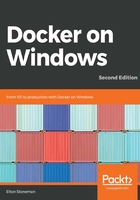
Building good citizens for Docker
The Docker platform makes very few demands on applications which use it. You're not restricted to certain languages or frameworks, you don't need to use special libraries to communicate between the app and container, and you don't need to structure your application in a certain way.
To support the widest possible range of applications, Docker uses the console to communicate between the application and the container runtime. Application logs and error messages are expected on the console output and error streams. Storage managed by Docker is presented as a normal disk to the operating system, and Docker's networking stack is transparent. Applications will appear to be running on their own machine, connected to other machines by a normal TCP/IP network.
A good citizen for Docker is an app which makes very few assumptions about the system it's running on, and uses basic mechanisms which all operating systems support: the filesystem, environment variables, networking, and the console. Most importantly, the application should only do one thing. As you've seen, when Docker runs a container, it starts the process specified in the Dockerfile or the command line, and it watches that process. When the process ends, the container exits. So ideally you should build your app to have a single process, which ensures Docker is watching the process that matters.
These are recommendations though, not requirements. You can start multiple processes in a bootstrap script when a container starts and Docker will run it happily, but it will only monitor the last process that started. Your apps can write log entries to local files instead of the console and Docker will still run them, but you won't see any output if you use Docker to check the container logs.
In .NET you can easily meet the recommendations by running a console application, which provides simplified integration between the application and the host, and it's one reason why all .NET Core apps – including websites and Web APIs – run as console applications. With legacy .NET apps, you won't be able to make them into perfect citizens, but you can take care to package them so that they make good use of the Docker platform.